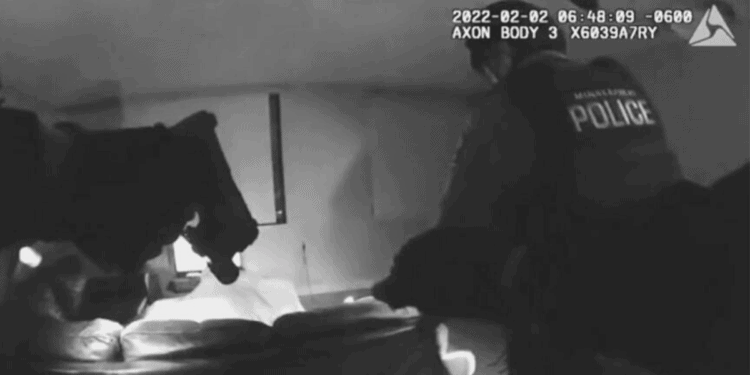Protests in Minneapolis over the death of a 22-year-old man during a police raid have reignited debate over the role of so-called “no-knock warrants.”
Minneapolis Mayor Jacob Frey imposed a moratorium on the practice, in which police obtain permission to enter a premises unannounced, and often accompanied by heavily armed SWAT team
As a former police officer, I took part in no-knock raids. Often they offered little return – my team ended up empty-handed, with no real criminal evidence. I now teach criminal justice and police ethics and have observed that the use of no-knock warrants has increasingly become a concern for those demanding criminal justice reform.
Obtaining a ‘no-knock’ can be a low bar
No-knock warrants are an exception to the “knock and announce” rule, a common law policing practice that requires an officer to make their presence and intention known, and then wait a reasonable time before entering a suspect’s home.
Usually this takes the form of a police officer knocking on the door loudly and then calling out “Police, we have a warrant” and waiting for the occupant to open the door.
The problem is, this can give suspects time to hide or dispose of evidence. To avoid this possibility, police can apply for a court-authorized exception.
To obtain any search warrant, police need to show probable cause that criminal activity is going on. For a no-knock provision, they have to articulate to a judge or a court clerk that, for example, there is reason to suggest drugs that could be easily disposed of, or that the suspect may have a gun that they could access on the property. Obtaining a no-knock exception is often a low bar.
Supreme Court rulings going back to the early 1960s have affirmed this ability to enter a home unannounced under certain circumstances, but it only really began to be used regularly under the so-called “War on Drugs.”
Beginning in the 1990s, amid public pressure on politicians and police to crack down on drugs, no-knock warrants became increasingly common.
Criminal justice scholar Peter Kraska notes that whereas in the early 1980s the annual number of no-knock warrants carried out by municipal police or sheriffs numbered around 1,500, this figure grew to around 40,000 in the 2000s, and is thought to be as high as 80,000 in recent years.
The increase in no-knock raids coincides with a period in which police forces became increasingly militarized, through the transfer of military-style weapons, armor and vehicles to police departments. No-knock warrants are often carried out by officers in heavy body armor using a battering ram to break down doors.
But just as their usage has increased, so has the controversy around no-knock warrants.
High-profile deaths, such as the recent one in Minneapolis – or of Breonna Taylor, killed in 2020 in a botched no-knock raid in Louisville, Kentucky – have highlighted the danger to life they pose. Often those injured or killed are not suspected of involvement in the crime being investigated. In the recent Minneapolis case, the man shot and killed by police, Amir Locke, had no involvement in the crime for which the warrant had been issued.
Part of the problem is that no-knock raids can cause chaotic scenes. Often they are conducted in the middle of the night – the suspects may wake up disoriented and not knowing who is breaking into their home. They might think it is a home invasion, or a rival drug gang.
Officers are supposed to say “police” as they enter, but it can be difficult to hear or understand what is going on over the noise of a battering ram and armed officers rushing into a room. Often, occupants say they did not hear police announce who they were upon entering.
No-knock raids can be dangerous for officers as well. Disorientated suspects may not be in a position to make rational decisions, or could instinctively reach for a legally owned firearm in self-defense. An investigation by The New York Times found that between 2010 and 2016, 81 civilians and 13 law enforcement officers were killed in no-knock and quick-knock raids (in which suspects are given only minimal time to respond).
Insufficient rewards for risks involved
There is also the issue of whether the potential risks of executing no-knock warrants is commensurate with the “rewards” for police. Is the seizure of evidence or contraband of sufficient value to law enforcement and the criminal legal system to justify the potential for injury or death?
Kraska’s research has noted that the majority of no-knock raids relate to marijuana searches. Drug consumption and distribution is typically a non-violent event. As such, there are concerns among criminal justice advocates that no-knock raids are an outsized response to what they would say is a relatively low-level offense.
No-knock warrants should, I believe, only be authorized in the most exceptional circumstances and where there are no alternatives, such as the apprehension of a suspected terrorist or a suspect barricaded in a premises while holding hostages. These types of circumstances often present the distinct possibility or even likelihood that serious injury or death to innocent persons may result if law enforcement officers are not allowed to act quickly and decisively.
But this is not what the majority of no-knock warrants are executed for.
More and more cities and police departments are reviewing the use of no-knock warrants. As someone who has taken part in such raids, I believe the payoff is frequently insufficient to justify the level of intrusion and the potential for violent and tragic outcomes.









